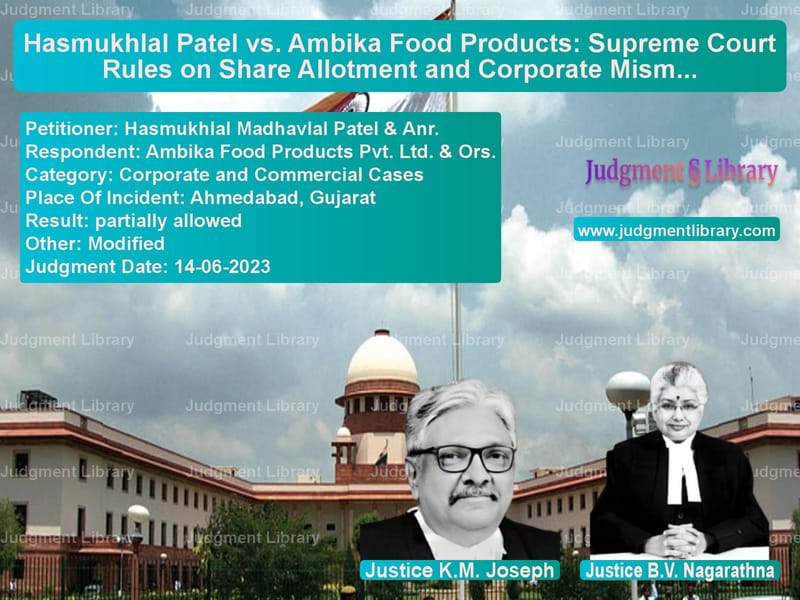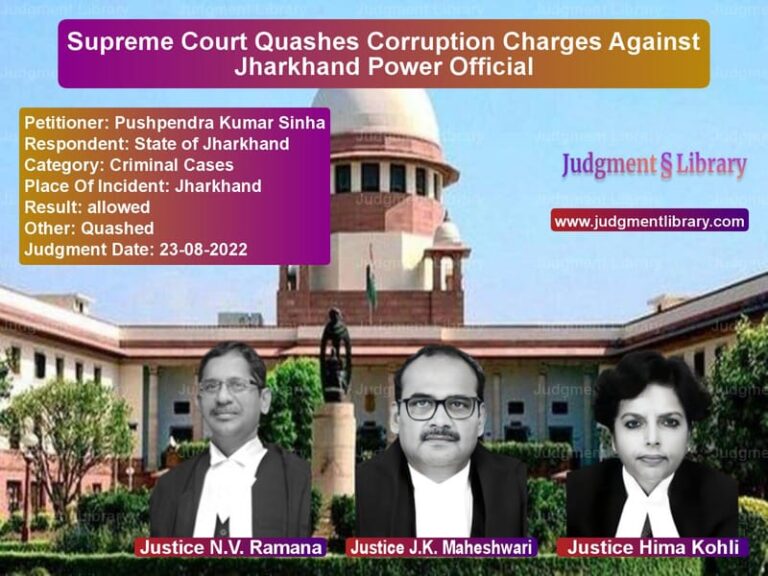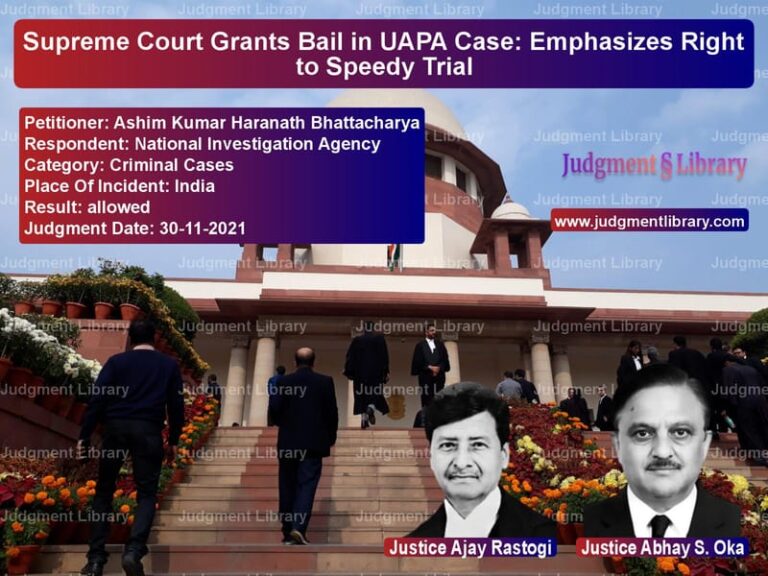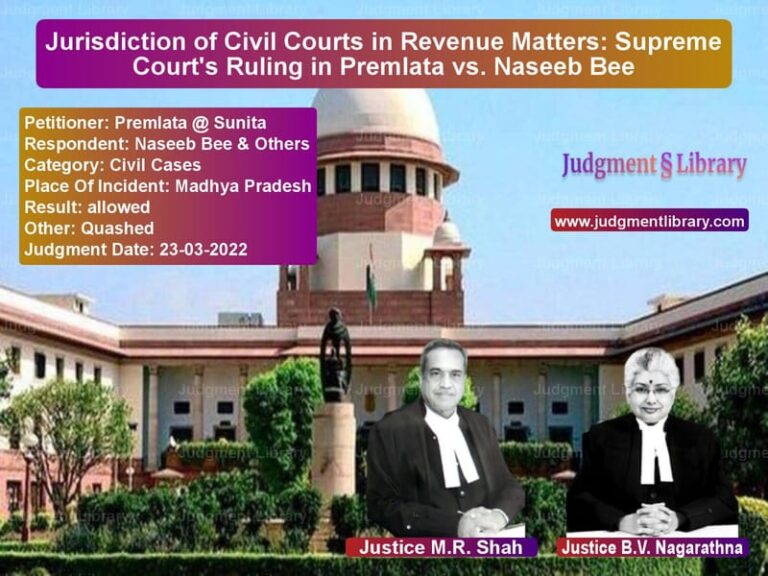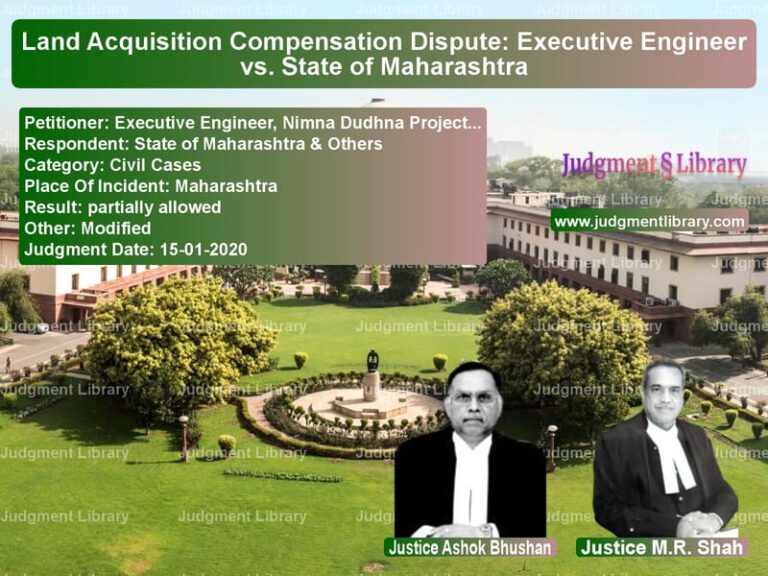Hasmukhlal Patel vs. Ambika Food Products: Supreme Court Rules on Share Allotment and Corporate Mismanagement
The case of Hasmukhlal Madhavlal Patel & Anr. vs. Ambika Food Products Pvt. Ltd. & Ors. revolves around allegations of corporate mismanagement, oppression, and unfair share allotment in a closely held private company. The Supreme Court, in its judgment dated June 15, 2023, examined whether the increase in share capital and subsequent allotment of shares by the company’s board was done in an unfair and oppressive manner.
The dispute arose between different shareholder groups of Ambika Food Products Pvt. Ltd. The appellants, holding 30.8% of the company’s paid-up share capital, were accused of increasing the authorized capital and issuing additional shares in a way that consolidated their control over the company. The respondents, who represented the remaining shareholder groups, challenged this action before the National Company Law Tribunal (NCLT) and the National Company Law Appellate Tribunal (NCLAT), which ruled in their favor. The Supreme Court, however, partially overturned these decisions, holding that the increase in share capital was legitimate but rejecting the direction to reallocate shares.
Background of the Case
Ambika Food Products Pvt. Ltd. is a closely held private company with the following shareholding structure before the dispute:
- H.M. Patel Group (Appellants): 30.8% of paid-up capital.
- Sheth Group (Respondents): 45% of paid-up capital.
- V.P. Patel Group (Respondents): 24.2% of paid-up capital.
The Sheth Group and V.P. Patel Group alleged that the H.M. Patel Group, which controlled the company’s board, engaged in oppressive practices by:
- Increasing the authorized capital from Rs. 1 crore to Rs. 2 crores without proper shareholder approval.
- Issuing additional shares in a manner that unfairly diluted the shareholding of the minority groups.
- Removing directors from the board without valid justification.
Key Legal Issues Considered
- Whether the increase in the company’s authorized capital was legally valid.
- Whether the allotment of additional shares was conducted in an unfair and oppressive manner.
- Whether the NCLT and NCLAT were correct in directing the redistribution of shares.
- The applicability of Sections 397 and 398 of the Companies Act, 1956, concerning oppression and mismanagement.
Supreme Court’s Analysis and Judgment
1. Legitimacy of Increasing Authorized Capital
The Supreme Court upheld the decision to increase the company’s authorized capital. The respondents had argued that the increase was a pretext to dilute their shareholding. However, the Court noted:
“The decision to increase authorized share capital was taken based on business requirements and was not, in itself, an act of oppression or mismanagement.”
The Court found that the increase in capital was based on a resolution passed in a duly convened Extraordinary General Meeting (EGM), following recommendations from the company’s bankers.
2. Allotment of Additional Shares
The critical issue in the case was the method of allotting additional shares. The NCLT and NCLAT had ruled that the allotment was unfairly conducted because:
- Existing shareholders were not given a fair opportunity to subscribe.
- Some shareholders were allotted disproportionate numbers of shares.
- The board preemptively allotted shares even before formal approval of the capital increase.
The Supreme Court acknowledged these concerns but held:
“The offer to subscribe for additional shares was made to all shareholders, and they had an equal opportunity to participate. The change in shareholding structure resulted from certain shareholders choosing not to subscribe, not due to manipulation by the appellants.”
The Court found that while some shareholders, such as the Sheth and V.P. Patel groups, chose not to apply for additional shares, the H.M. Patel Group took full advantage of the opportunity. Since there was no evidence of coercion or concealment, the Court ruled that the allotment was not inherently oppressive.
3. Removal of Directors
The Supreme Court upheld the NCLT’s decision that the removal of certain directors was invalid. It emphasized:
“The removal of respondents as directors was procedurally flawed and did not follow fair corporate governance practices.”
4. Reallocation of Shares
One of the most contentious issues in the case was whether the Supreme Court should uphold the NCLT’s directive to redistribute shares among shareholders. The Court rejected this directive, stating:
“The direction to reallocate shares is unsustainable. The principle of free market participation applies, and courts cannot rewrite contractual and corporate arrangements in the absence of clear illegality.”
Final Ruling
- The Supreme Court upheld the validity of the increase in authorized share capital.
- It ruled that the share allotment process was not unfair since all shareholders were given an equal opportunity to participate.
- The removal of certain directors was found to be invalid, reinforcing the need for due process in corporate governance.
- The Court overturned the NCLT’s order for redistributing shares, stating that courts cannot force a reallocation absent clear wrongdoing.
Implications of the Judgment
This ruling has significant implications for corporate governance and shareholder rights:
- It reinforces that courts will not interfere in corporate decisions unless there is clear evidence of oppression or mismanagement.
- It upholds the principle that shareholders must actively participate in corporate affairs to protect their interests.
- It clarifies that increasing authorized share capital, in itself, is not an act of oppression if done for valid business reasons.
- It limits judicial intervention in private company affairs, emphasizing market-based resolutions over court-imposed solutions.
Conclusion
The Supreme Court’s ruling in Hasmukhlal Patel vs. Ambika Food Products balances the need for corporate autonomy with safeguards against mismanagement. By upholding the capital increase and share allotment while striking down unfair director removals, the judgment strengthens corporate governance and ensures that shareholder disputes are resolved through proper business channels rather than excessive judicial intervention.
Petitioner Name: Hasmukhlal Madhavlal Patel & Anr..Respondent Name: Ambika Food Products Pvt. Ltd. & Ors..Judgment By: Justice K.M. Joseph, Justice B.V. Nagarathna.Place Of Incident: Ahmedabad, Gujarat.Judgment Date: 14-06-2023.
Don’t miss out on the full details! Download the complete judgment in PDF format below and gain valuable insights instantly!
Download Judgment: hasmukhlal-madhavlal-vs-ambika-food-products-supreme-court-of-india-judgment-dated-14-06-2023.pdf
Directly Download Judgment: Directly download this Judgment
See all petitions in Corporate Governance
See all petitions in Shareholder Disputes
See all petitions in unfair trade practices
See all petitions in Judgment by K.M. Joseph
See all petitions in Judgment by B.V. Nagarathna
See all petitions in partially allowed
See all petitions in Modified
See all petitions in supreme court of India judgments June 2023
See all petitions in 2023 judgments
See all posts in Corporate and Commercial Cases Category
See all allowed petitions in Corporate and Commercial Cases Category
See all Dismissed petitions in Corporate and Commercial Cases Category
See all partially allowed petitions in Corporate and Commercial Cases Category

